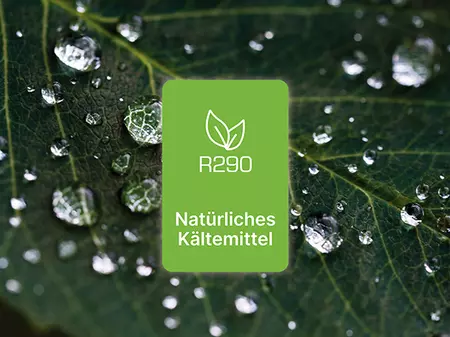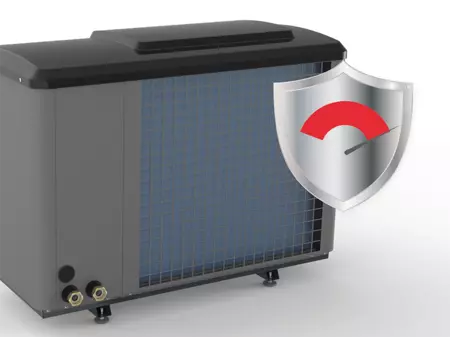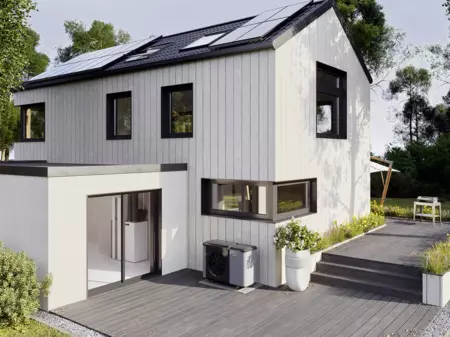Yes, in principle. But older houses may need more renovation and conversion measures than newer buildings. If draughts whistle through the old windows and heat is sucked away through uninsulated walls, you should combine the installation of an air source heat pump with energy-related renovation of the building envelope. In this way, you can ensure that the heat pump works as efficiently as possible.
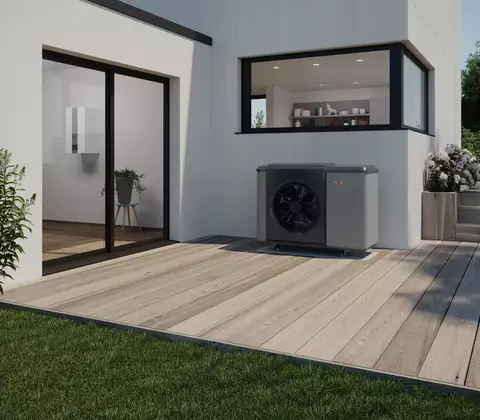
Air-to-water heat pumps
What you need to know
Air-to-water heat pumps are already the most popular type of heating system used in new buildings. Find out more about how they work, their benefits and drawbacks and what you should consider regarding your new building or existing building.
Table of contents
A modern heating system using an air-to-water heat pump is indeed very efficient. But brine-to-water and water-to-water heat pumps are even more efficient and therefore consume even less electricity. Furthermore, the energy yield of air-to-water heat pumps at low outside temperatures is not quite as good as at higher temperatures.
Two further points that you should know about: air-to-water heat pumps may be cheaper to buy than other types of heat pump, but they are still more expensive than oil or gas boilers.
And air source heat pumps require large volumes of air. Consider the installation site during the planning phase as well as the noise generated by the fans as they take in air. It is best to select a super quiet model.
03. Types of air source heat pumps
Monoblock heat pumps for outdoor installation
Monoblock heat pumps combine all components in a single housing. This makes installation a breeze. When installed outdoors, the air-to-water heat pump will be located in the garden or courtyard of your house. This saves space in the boiler room.
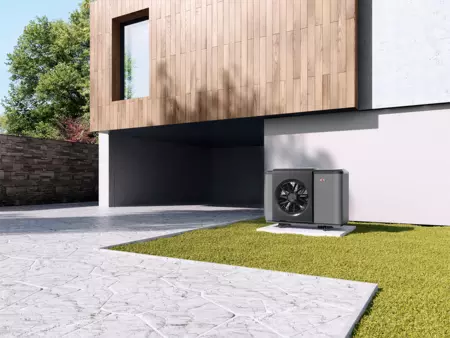
Monoblock heat pumps for indoor installation
If installed indoors, a monoblock air source heat pump will be positioned in the boiler room. The pipes used to transfer heat are especially short in this scenario.
Split heat pumps
With split heat pumps, the technical components are divided into an outdoor unit and an indoor unit. This design is especially flexible. A specially trained refrigeration engineer must install the system as the refrigerant circuit leads from the outside to the inside of the building.
DHW heat pumps
DHW heat pumps are special types of air source heat pumps. They only supply hot water for the bathroom and kitchen and do not provide heat for running a heating system. DHW heat pumps generally come equipped with a hot water tank. They are perfect for installing during renovation projects as they can be the ideal supplement to conventional types of heating systems.

04. Things to consider when choosing an air source heat pump
Air source heat pumps achieve their full potential efficiency when used in combination with radiant panel heating, such as underfloor heating. The lower the flow temperature, the better they work. So it is important to take the entire system of heating technology into account when planning your heating. If you also wish to cool your home later on using the heat pump, this factor should be considered during the planning phase.
Whether your home is new or older, you should take the following points into account to ensure that your heat pump system works perfectly:
The higher the seasonal performance factor (SPF) of a heat pump, the more efficiently it will produce heat using electricity.
Just like washing machines or fridges, heat pumps must feature an energy efficiency label issued by the European Union. Make sure your appliance has an A+++ label.
Modern air-to-water heat pumps with inverter technology can modulate their heating output. This means that they only produce as much heat as your home currently needs, which reduces the amount of electricity consumed by the air source heat pump and lowers the cost of operation and heating.
Some refrigerants used in heat pumps are potent greenhouse gases with an effect that is many times stronger than CO2 if they leak into the ambient air. The refrigerant R290 is a climate-friendly and natural alternative.
Answers to your questions about air-to-water heat pumps
No. Air source heat pumps are heating systems that you can install without a permit.
Heat pumps always need a storage cylinder for the purpose of heating domestic hot water. But it can also make sense to install a cylinder for the central heating system. This allows you, for example, to use your own photovoltaic electricity during the day and retrieve the heat from the cylinder at night or on cloudy days.
A properly designed and configured heat pump is just as reliable as a conventional heating boiler. It will have no problem heating your home to the desired temperature even on cold winter days and will provide ample hot water at all times.
Federal subsidy agencies at state, county and local levels provide support for purchasing air source heat pumps. To obtain this funding, certain conditions must be fulfilled when planning a new building and should be considered in good time. Furthermore, lucrative funding is available for the energy-related modernisation of older buildings.
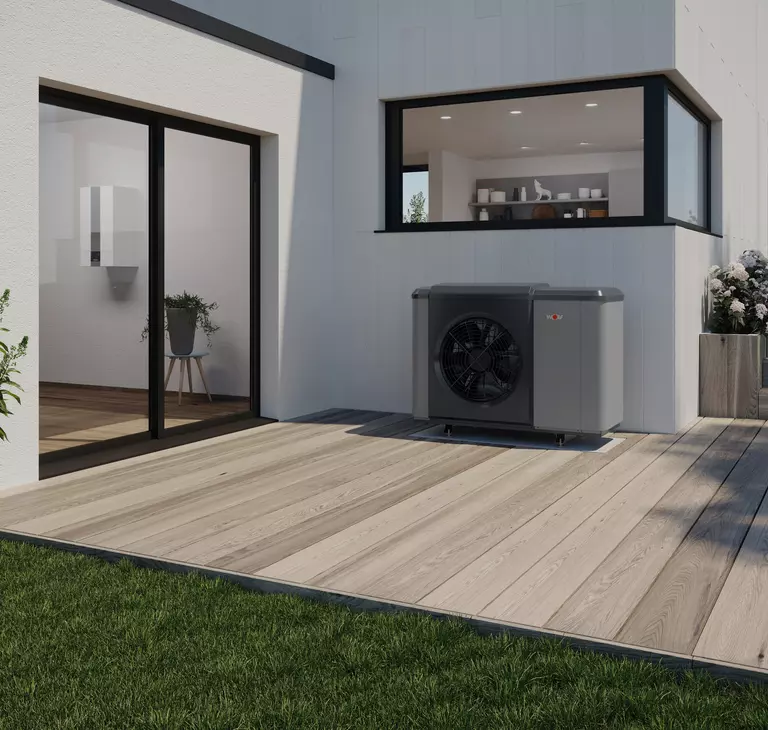
Our recommendation: The CHA Monoblock
50 years of experience have gone into the development and design of our top seller in the heat pump sector.
